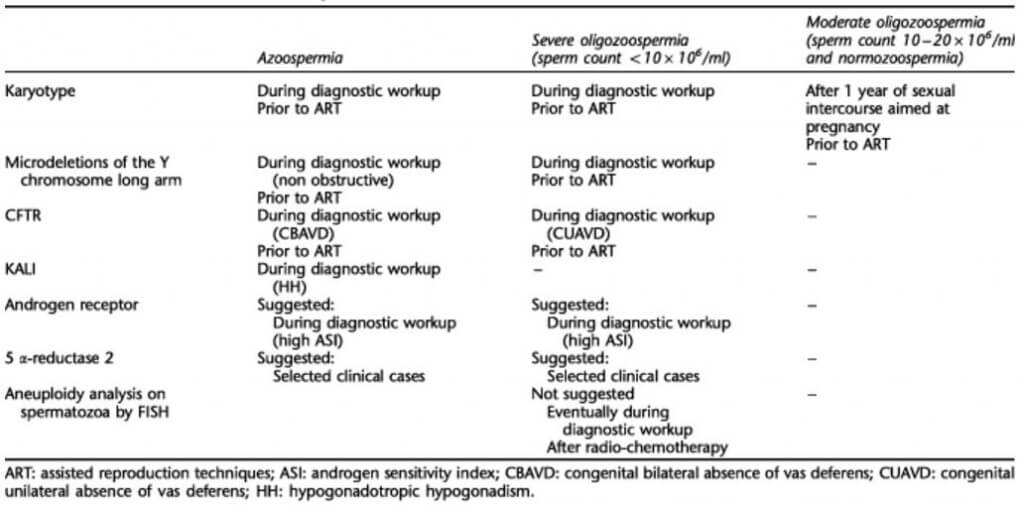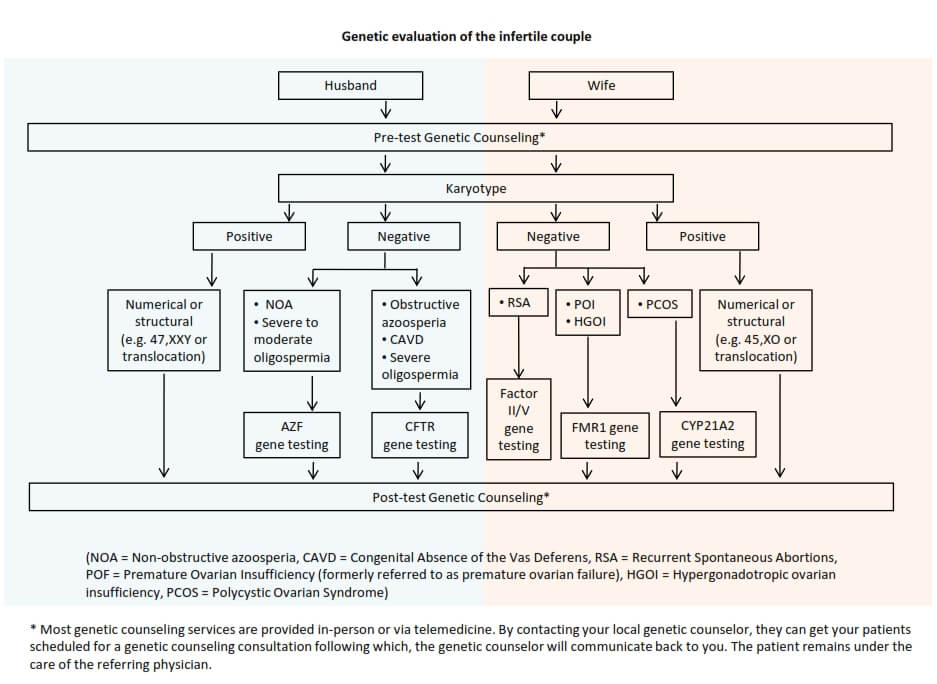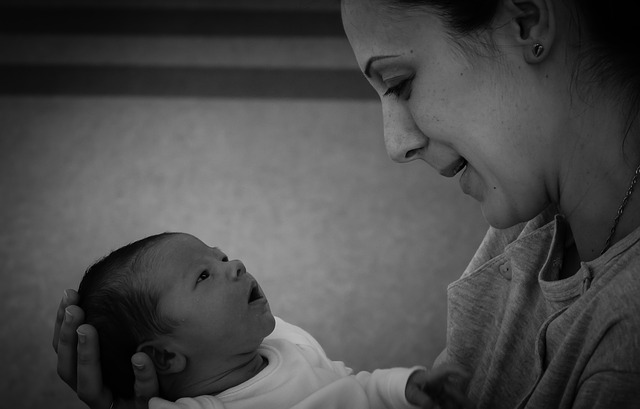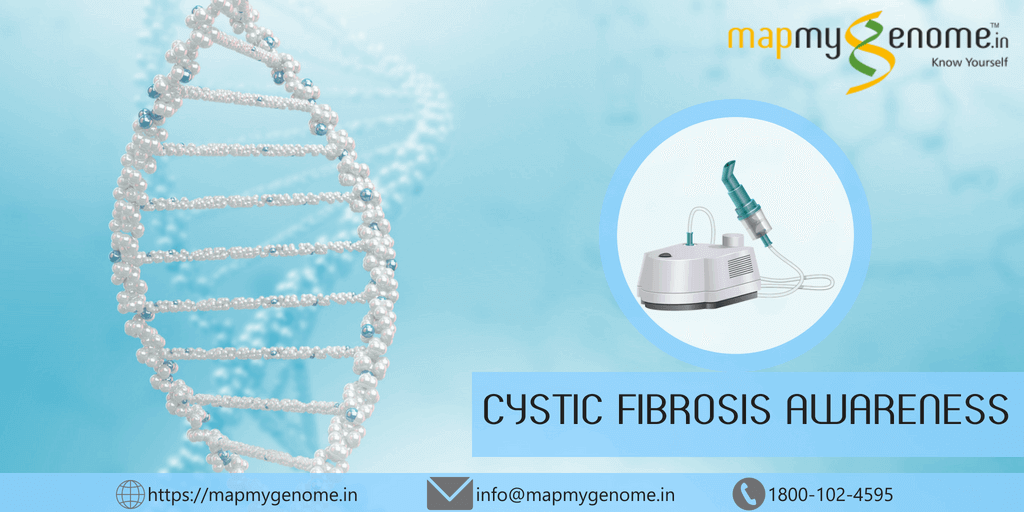
What is infertility?
Infertility is a complex condition of the reproductive system. It is defined as the inability to achieve pregnancy after one year (or longer) of unprotected sex. Some providers evaluate couples for infertility after 6 months of unprotected sex if the female partner is 35 years or older. Infertility is equally attributed to men and women. Infertility is, in fact, not uncommon, and nearly 15% of all couples planning a pregnancy experience infertility.
Infertility can have a genetic cause
Approximately 10% of couples experiencing infertility have an underlying genetic cause. In the absence of a genetic evaluation for infertility, couples are routinely subjected to a battery of physical tests that are not only expensive and time-consuming, but can also cause significant psychological distress. Identifying the exact cause of infertility facilitates more well-informed medical decisions, can help parents-to-be understand any potential risks it poses for their future children, and can guide appropriate treatment. It also permits healthcare professionals to offer a prenatal diagnosis when appropriate.
The use of intracytoplasmic sperm injection (ICSI) in the treatment of infertility has raised major concerns about risks to the offspring, as it bypasses the natural physiological mechanisms that lead to fertilization. While natural selection prevents the transmission of mutations causing infertility, this protective mechanism is overcome by the assisted reproduction techniques (ART). Consequently, the risk of a genetic cause of infertility increases in future generations. Therefore, the identification of genetic factors in a couple experiencing infertility has now come to become good practice for appropriate management of the infertile couple.

Can we quit the blame game, please? It’s no one’s “fault”!
Oftentimes, the reasons why a couple cannot have a baby can be difficult to determine. Finding a male factor as the sole reason for a couple’s infertility is seen in about 20% of infertile couples. Yet, sadly, infertility is often thought of as a “woman’s issue”, and this does a great disservice to couples pursuing an evasive pregnancy. Evaluating both partners is critical in the assessment of couples with infertility. It is important to remember to be sensitive- No one really wants to experience infertility, and no one did anything to intentionally cause themselves to experience infertility. It is not their fault! The purpose of establishing a cause for infertility is not to point fingers, but to medically address that cause in the most appropriate way. Genetic evaluation of couples experiencing infertility helps identify:
- Potentially correctable conditions
- Irreversible conditions that can be addressed using assisted reproductive techniques (ART)
- Irreversible conditions that cannot be treated via ART
- Serious genetic conditions underlying infertility that require medical intervention
- Genetic abnormalities that pose a risk for ART to pass on a specific genetic condition to future children
Infertility in men
In males, genetic abnormalities may cause infertility by affecting sperm production or sperm transport. The most common genetic causes of male infertility are cystic fibrosis gene (CFTR) mutations, chromosomal abnormalities, and Y-chromosome microdeletions. In fact, up to 15% of men with low or absent sperm counts have Y chromosome microdeletions. Detecting the type of Y chromosome microdeletion is extremely significant as:
- Most men with Y chromosome microdeletions will not have retrievable sperm with TESE (testicular sperm extraction)
- Contrastingly, men with AZFc Y chromosome microdeletions (which is the most frequent microdeletion of the Y chromosome) have an 80% success rate of sperm retrieval
Without knowing the type of Y chromosome microdeletion, physicians and couples may pursue a reproductive option that offers little chance for pregnancy success. Y chromosome microdeletions are too small to detect through standard karyotyping, but both Y chromosome microdeletions and karyotyping can reveal genetic causes of male infertility.
Karyotyping can detect chromosome abnormalities such as inversions and balanced translocations that occur more prevalently in infertile male populations compared to the general population.
While an in-depth discussion of all the genetic causes of infertility in men is beyond the scope of this article, speaking with a genetic counselor can be extremely helpful in helping couples understand what might be the most appropriate test for them. Overall, genetic tests useful in the evaluation of males are outlined in the table below:

Other important, but rare, causes of infertility in men include genetic conditions in which infertility is a minor manifestation. Some of these genetic conditions include:
- Myotonic dystrophy
- 5-alpha-reductase 2 deficiency
- 21 alpha-hydroxylase deficiency
- Bardet-Biedl syndrome
- Fanconi anemia
- Homozygous beta-thalassemia
- Hemochromatosis
- Cerebellar ataxia with hypogonadotropic hypogonadism
- Prune Belly syndrome
- Prader-Willi syndrome
Infertility in women
In women, genetic abnormalities may result in infertility by affecting the reproductive cycle and/or hormonal balance. A genetic cause for couples experiencing infertility can be found in about 10% of women. These genetic findings include chromosome aberrations and single gene mutations. The most common genetic causes of female infertility are chromosomal abnormalities and mutations in the FMR1 gene on the X-chromosome, responsible for Fragile-X syndrome.
Karyotype analysis is an important component of the diagnostic workup of women with infertility. This especially significant for those women who presenting with primary ovarian dysfunction or recurrent fetal loss/miscarriages. Karyotype analysis for the identification of chromosomal abnormalities should be included as a mandatory diagnostic test in the evaluation of infertility in women.
Fragile X syndrome is the most common inherited cause of mental retardation and the most common genetic cause of autism worldwide. Fragile X may cause may cause intellectual disability, learning and behavioral challenges, and, sometimes, seizures. It tends to be more severe in boys than in girls. Women who are carriers of Fragile-X do not show symptoms of Fragile-X syndrome, but may be at risk for related disorders such as Fragile X-associated Tremor/Ataxia Syndrome (FXTAS). Importantly, from a reproductive point of view, they are at risk for premature ovarian failure– a condition that is often times picked up during routine infertility tests as low AMH/high FSH.
A genetic counseling appointment is critical in making an assessment of family history in order to arrive at the most relevant genetic test for a particular couple. Important genetic tests in the evaluation of infertility in women are listed in the table below:

In addition to these commonly used genetic tests, depending on family history and genetic counseling assessment, there are a few genetic conditions that may present as infertility among women. These genetic conditions include:
- Galactosemia
- Mucopolysaccharidoses
- Myotonic dystrophy
- 21 alpha-hydroxylase deficiency
- Hemochromatosis
- DAX1 mutations
- Homozygous beta-thalassemia
- Prader-Willi syndrome

When should genetic evaluation be considered?
A referral to a genetic counselor is appropriate in the following situations:
- Failure to conceive after trying for six months or longer
- Low sperm count, abnormal sperm morphology or movement
- Irregular or absent menstruation
- Small or atypical genitals and secondary sexual features (hair, breasts, etc.)
- Known fertility problems
- A history of >1 miscarriage
The flowchart below can be used to guide the genetic evaluation in couples with infertility:

It is further strongly recommended that if/when a genetic anomaly is identified in either member of the couple, it is the couple’s decision regarding whether or not to proceed with ART; and genetic counseling is warranted.
So what’s the take away?
- Infertility is tough- medically, financially, psychologically. Genetic counseling should be offered to all couples experiencing infertility, especially prior to undergoing ART in order to achieve the most effective treatment option (as relevant) as soon as possible.
- A genetic counselor is an expert in medical genetics and psychological counseling, is a patient advocate, and plays a crucial role in facilitating reproductive decision-making for couples based on their values, their belief systems, and their choices.
- These decisions can be made once the couple has clearly understood the genetic risks and potential outcomes when ART is used
- Finally, while genetic counseling and genetic testing could potentially increase the cost of ART by a small proportion, patients would benefit significantly from making more fully informed decisions for themselves as well as for their future children.
If you have been experiencing infertility and would like to set up a genetic counseling appointment to discuss your reproductive options, CALL US on 1800 102 4595 (toll-free) or 040-66986700 or WRITE TO US at info@mapmygenome.in






